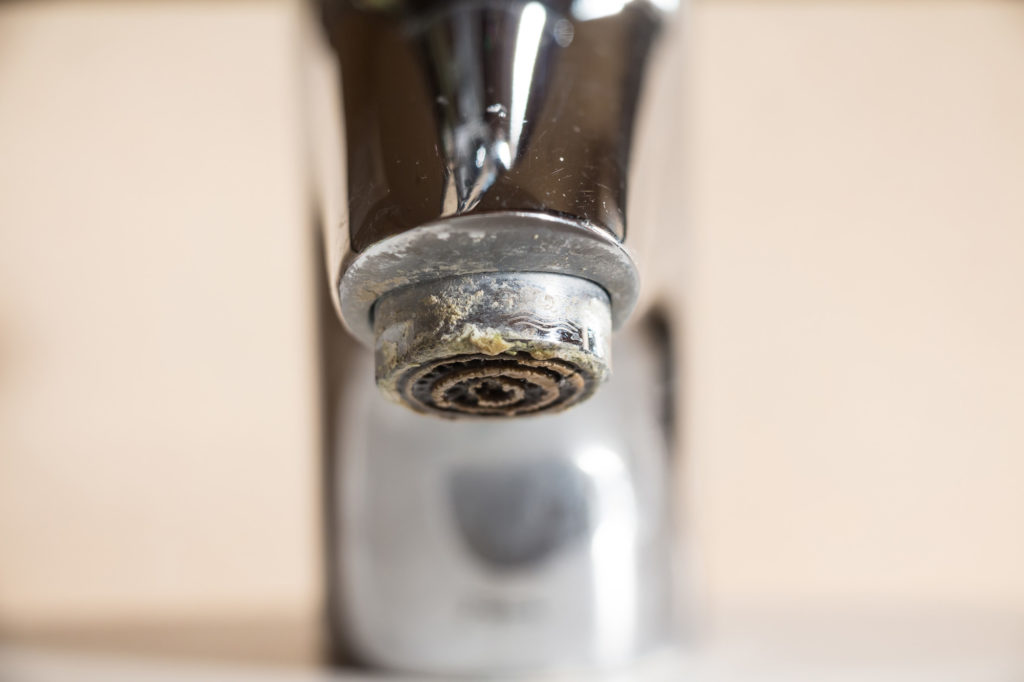Water isn’t usually a subject talked about around the water cooler in the office. Moms don’t discuss it while waiting for the kids to get off the bus. Guys probably don’t strike up a conversation about tap water on the golf course either.
If no one wants to talk about it, how will any of us know whether we have an issue with hard water in our home?
So, you won’t hear about it on cable news, or in the breakroom but if you stick with us for a minute, we’ll share 7 signs of hard water that you can look for at home.
These aren’t signs you should ignore, and in some cases, you can’t ignore them. For example, as you read, you’ll notice many of the signs deal with one or two of your five senses.
1. The Smell of Rotten Eggs
One telltale sign of hard water is the smell. Have you ever smelled a rotten egg? If not, what about sulfur?
While pure sulfur has no odor, its compounds do, and they give off quite a stink. In fact, it’s sulfur that makes a skunk so odiferous. And sulfur gives eggs that have gone bad and stink bombs their special stench.
The rotten egg smell occurs naturally when hydrogen sulfide gas is present. Also, when certain bacteria reacts with magnesium, sulfate forms. The result is the rotten egg odor.
Magnesium and calcium are two of the minerals responsible for hard water. But wait, aren’t these minerals good for you?
If you’re concerned about losing out on the health benefits of certain minerals, consider installing a salt free water softener. A salt-free system doesn’t eliminate the minerals—it crystallizes them.
Goodbye hard water, hello healthy minerals.
2. Your Water Tastes Funny
Water shouldn’t taste like much of anything. If you take a drink of water from your tap and it has a metallic taste, hard water may be the culprit.
Specifically, your water likely contains an overabundance of minerals. Iron is one mineral that can give water a metallic taste.
Hard water and plumbing pipes don’t play well together at all. Usually what happens is hard water causes a heavy buildup of scale inside the pipes. The scaly buildup may make your tap water taste moldy or muddy.
If you’re investing in bottled water every week to avoid the taste of your tap water, look into what you can do to cure hard water.
3. Ugly Brown Stains
Ever taken a shower at a friend’s house and felt grossed out by rusty stains around the drain? Maybe it’s your tub and toilet with the ugly brown stains! Don’t blame it on a lack of cleaning skills.
Hard water often contains an excessive amount of iron. Blame the condition of your water for those rusty spots on the porcelain.
While you can clean the stains, if you don’t fix the hard water issues, they’ll come back.
4. These Glasses Have Spots
Whether you use a dishwasher or wash them by hand, seeing spots on your drinking glasses can indicate you have a hard water problem. It’s not only glasses. Hard water causes white spots on dishes and flatware.
You see spots when the minerals in your hard water mix with your dishwashing detergent. The minerals then stick to the dishes.
Maybe your solution is leaving them in the dishwasher for a second cycle. That’s another dose of minerals, so you may find the spots are even worse.
You can buy a rinse aid for the dishwasher, but that doesn’t eliminate hard water.
5. You Constantly Battle Scaly Buildup
If you look to your shiny chrome kitchen and bathroom fixtures as proof of your cleaning skills, hard water will disappoint you at every turn.
When you battle scale or film on the faucets, showerhead, and other fixtures, it’s a guarantee you have hard water. You might even find scaly buildup on your porcelain, fiberglass, and soap dishes.
You can buy cleaners that dissolve the scale, but do you really want all those chemicals?
Conditioning the water probably works better. And it’s a healthier option for you and your family.
6. People in Your Home Itch
When your family complains about dry and itchy skin, check your water!
Hard water can irritate the skin and soaking or showering in it, may cause extreme dryness. If you have sensitive skin, the minerals in hard water are not your friends. For people with eczema, hard water can make symptoms worse.
While we’re talking about the signs your body gives you about hard water, feel your hair. Dull, dry hair often indicates a hard water issue.
7. Who Used All the Hot Water?
There’s nothing worse than expecting a long, hot shower and realizing you’re out of hot water.
Most people blame it on other people in the house using up the hot water. While this certainly happens, did you know hard water buildup can also make you run out of hot water?
It’s the minerals! The minerals buildup on your water heater’s heating element. Over time, the element stops working. Obviously, no heating element, no hot water.
Have You Noticed Signs of Hard Water?
When you have hard water piping into your home, it’s not always easy to diagnose. The most obvious signs of hard water are annoying scaly buildup and filmy white spots in your kitchen and bathroom.
You might also notice odd smells and funny tastes when you use your tap water. Sometimes your body lets you know you have a problem when your skin itches or your hair is dull.
Hopefully, this post helped you determine whether you have a hard water problem. If you enjoyed reading it, check out our archives for more articles on how to deal with other issues you might find in your home.

Leave a Reply